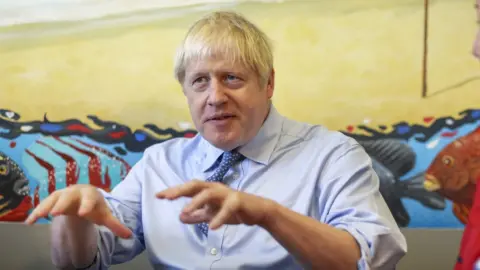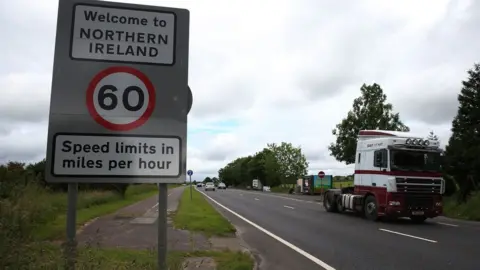Boris Johnson: UK 'will be ready' for no-deal Brexit
 EPA
EPABoris Johnson has insisted preparations for a no-deal Brexit are on track, despite a leaked report warning of potential food and medicine shortages.
The prime minister said preparations had been "very far advanced" ahead of the original 29 March deadline.
Meanwhile, Mr Johnson has written to EU Council President Donald Tusk to outline his opposition to the Irish border backstop plan.
Jeremy Corbyn has vowed to do "everything necessary" to stop no deal.
In a speech earlier, the Labour leader said the leaked report made it "crystal clear how bad things will get" if the UK leaves without a deal on 31 October.
He added that the leak showed "chaos and dislocation" after a no-deal was "very real and threatening".
It comes as local council planning documents seen by the BBC warned that school meal nutrition standards may need to be amended or discarded after a no deal.
Some councils are anticipating they will not meet the standards because of an anticipated rise in food prices and restriction of choice.
'Flexible and creative solutions'
According to Operation Yellowhammer, the dossier leaked to the Sunday Times, the UK could face months of disruption at its ports after a no-deal Brexit.
Plans to avoid a hard border between Northern Ireland and the Irish Republic are unlikely to prove sustainable, it adds.
Michael Gove, the cabinet minister responsible for no-deal planning, has said the information in the leaked dossier was old and Brexit planning had accelerated since Mr Johnson became prime minister.
The BBC has been told the study was first seen by devolved governments earlier this month.
Speaking on Monday, Mr Johnson said he was "confident" the EU would agree to a new Brexit deal, but the UK would be ready to leave without one if needed.
"I'm not pretending that there won't be bumps on the road […] but if everybody puts their minds to it, I have absolutely no doubt that we can get ready," he added.
The prime minister has said he wants to leave the EU with a deal, but the UK must leave "do or die" by the end of October.
 PA Media
PA MediaHe wants the EU to ditch the Irish border backstop plan from the deal negotiated by Mrs May, which was rejected three times by Parliament.
In his letter to Mr Tusk, Mr Johnson insisted he was committed to ensuring there was no hard border.
He proposed "flexible and creative solutions to the unique circumstances on the island of Ireland".
"I propose that the backstop should be replaced with a commitment to put in place such arrangements as far as possible before the end of the transition period, as part of the future relationship," he wrote.
The EU has continued to insist the policy - intended to guarantee there will not be a hard Irish border after Brexit - must remain and cannot be changed.

View from the EU

Those involved with drafting the backstop read and re-read the prime minister's letter with mounting dread.
It shows that the UK is not committed to a fully worked up - "legally operable" - insurance policy for the Irish border to be contained in the Brexit divorce treaty. That crosses a major EU red line.
Instead Mr Johnson has proposed using the post-Brexit transition period to search for alternative ways of keeping the border open.
If they can't be found, the UK is committing to having a fall-back option. Yes… something you might call "a backstop."
A lot of this had been telegraphed to the EU in advance by the prime minister and his advisers but it feels different now it's on paper.
Tonight European diplomats wonder whether they are being asked to sign up to something that's too vague, too difficult to achieve, or just too hard for them to accept.

Recall demand rejected
Mr Johnson's comments came after Downing Street rejected calls from Mr Corbyn and 100 MPs for Parliament to be recalled from its summer recess to discuss Brexit.
A No 10 spokeswoman said a large majority of MPs had previously voted to approve the motion specifying that Parliament would return on 3 September.
Mr Gove is expected to update MPs on no-deal preparations when the Commons returns.
Speaking earlier, Mr Corbyn said a general election was required to offer the "change of direction the country needs".
He has sought the support of opposition MPs for a plan under which he would be installed as caretaker PM if the government is defeated in a no-confidence motion when the Commons returns from recess in two weeks' time.
Under his proposal, Mr Corbyn would form an emergency government, delay Brexit, call a snap election and campaign for another referendum.
The SNP and Plaid Cymru have not ruled out their support for the plan but the Liberal Democrats and some potential Tory allies have said they would not support putting Mr Corbyn in Downing Street.
Mr Johnson is travelling to France and Germany to meet EU leaders later this week.
The prime minister will insist there must be a new Brexit deal when he holds talks with German Chancellor Angela Merkel and French President Emmanuel Macron.
What did the leaked no-deal document say?
The leaked dossier said leaving the EU without a deal could lead to:
- Fresh food becoming less available and prices rising
- A hard Irish border after plans to avoid checks fail, sparking protests
- Fuel becoming less available and 2,000 jobs being lost if the government sets petrol import tariffs to 0%, potentially causing two oil refineries to close
- UK patients having to wait longer for medicines, including insulin and flu vaccines
- A rise in public disorder and community tensions resulting from a shortage of food and drugs
- Passengers being delayed at EU airports, Eurotunnel and Dover
- Freight disruption at ports lasting up to three months, caused by customs checks, before traffic flow improves to 50-70% of the current rate.
